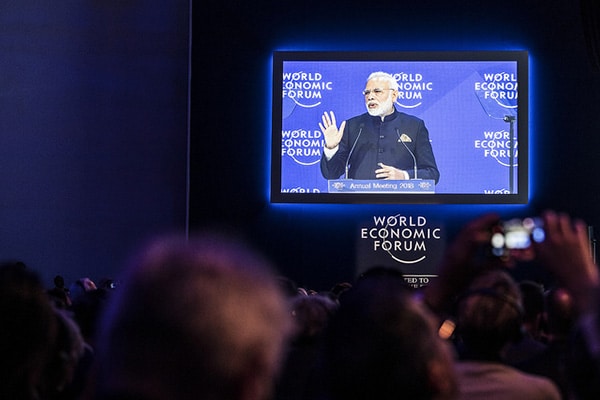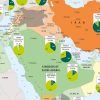
Shop window, megaphone and venue for discreet meetings: Davos is all these things. The main participants at the most recent World Economic Forum were the major states –geopolitical problems sometimes stem from others of lesser calibre– and the large technology and IT companies. It has been held at a time of concerted global economic growth, tempered by concern about the emergence of troubled societies. The Forum opened with the presentation of an Oxfam report on inequality, which revealed that 82% of the new wealth created last year went to the richest 1%, whereas half of the least well-off failed to benefit at all. The Managing Director of the International Monetary Fund, Christine Lagarde, took a similar tack when she argued that too many people are excluded from worldwide growth (forecast by the IMF to be 3.9% in 2018 and 2019). According to her calculations, in a fifth of developing and emerging economies income per head declined in 2017.
The large European states –including Spain, represented by King Felipe VI– presented a united front in defence of free trade. Whereas last year the forum heard a speech along these lines given by the Chinese Premier, Xi Jinping, this time it was the Indian leader, Narendra Modi, who picked up the gauntlet, warning that globalisation is ‘slowly losing its lustre’, that ‘the forces of protectionism are raising their heads against it’ and that they seek to ‘reverse its natural flow’. ‘Globalisation must make sense to people and improve their lives; otherwise we will see a new generation of nationalists and extremists’, warned the French President, Emmanuel Macron. Although concerns about populism seem to have diminished among those attending Davos, Merkel was still warning about its ‘poison’, by which she was referring to ‘polarisation’.
Arrayed against them was Donald Trump, whose arrival was preceded by tariff hikes on US imports of solar panels and washing machines from China and South Korea. The divisions at the heart of his Administration were laid bare when his treasury secretary, Steven Mnuchin, spoke of weakening the dollar (to which the markets responded), only to be corrected by his President, who endorsed a strong currency. Trump, who tried to temper his combative style with a degree of charm, did not espouse an explicitly protectionist or isolationist stance on this globalist stage, ill-disposed to such talk, but advocated free trade, albeit what he termed ‘fair and reciprocal’ trade. ‘America first’, certainly, but not ‘America alone’. His real views will become clear at his State of the Union speech in Washington, which will reveal whether, in the words of the analyst Robert Kaplan, ‘his bark is worse than his bite’. By contrast the Canadian leader, Justin Trudeau, used the Davos stage to announce that 11 countries had made progress on the Trans-Pacific Partnership, from which the US had withdrawn at Trump’s behest. Was this a first response to a world order without the US, a subject on which Davos was largely silent
The most forceful Chinese contribution came from the private sector in the form of Jack Ma, founder and chairman of Alibaba, the huge sales platform, who said ‘if trade stops, war starts’. Ma also made a prediction: ‘In the future there will be no made in China, no made in America, no made in Peru. It’s going to be “made on the Internet”’. Ma’s business, which is expanding outside China, and other giant online retailing platforms (and much else besides retailing), such as Amazon, are in many people’s sights. There is a growing chorus of voices, also audible in Davos, calling for these mega-platforms to be subjected to the rigours of free competition, for their monopolies to be broken up. The same applies to other tech companies such as Facebook. As far as Ma is concerned, ‘Google, Facebook, Amazon and Alibaba – we are the luckiest companies of this century. But we have the responsibility to have a good heart, and do something good. Make sure that everything you do is for the future’.
Perhaps it was George Soros who most explicitly railed in Davos against the social media and the monopolies in technology. As far as the Hungarian-born financier and philanthropist is concerned, ‘Social media companies deceive their users by manipulating their attention and directing it towards their own commercial purposes. They deliberately engineer addiction to the services they provide’. Later at a dinner in Davos he added, ‘Something very harmful and maybe irreversible is happening to human attention in our digital age. Not just distraction or addiction; social media companies are inducing people to give up their autonomy. The power to shape people’s attention is increasingly concentrated in the hands of a few companies’; there is the accompanying danger of an Orwellian future, when such capabilities are combined with those of an authoritarian state, as already happens in certain places, starting with China. Beyond Davos, in order to curb Facebook Germany is looking at the way the company amasses the data of millions of users, in what would be an unprecedented intervention in the social network’s business model. Some of the large tech companies were apologetic in Davos, and expressed a willingness to make partial amends. Sundar Pichai, the CEO of Google, acknowledged the criticisms, and claimed to be prepared to pay more taxes if they were overseen by the OECD. Among nations, among such corporations and among societies change is afoot. Possibly a great deal of change.


